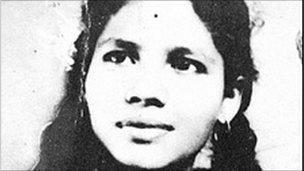India court rejects Aruna Shanbaug euthanasia plea
- Published

Ms Shanbaug worked as a nurse in the hospital where she was attacked
India's Supreme Court has rejected a plea to end the life of a woman who has been in a vegetative state since 1973.
Aruna Shanbaug suffered severe brain damage and has been paralysed since a brutal rape in 1973.
But the court said the medical evidence suggested that she should live.
However, in what correspondents are calling a "landmark" judgment, the court also said some cases of euthanasia could be sanctioned if doctors were to file a case in court.
Previously all forms of euthanasia were illegal in India. Following the judgement, India's law minister called for a "serious debate" on the issue.
The BBC's Jill McGivering says the court judgement puts the onus on doctors to petition to withdraw life support, under the supervision of the courts.
In a complex judgement, the court said "passive euthanasia", or the withdrawal of food from a patient, may be considered in certain circumstances.
The decision to open the door to assisted suicide is likely to be controversial, our correspondent adds.
Verdict 'celebrated'
The case for Aruna Shanbaug was filed by a journalist who had written a book about her.
In her petition, Pinki Virani said that Ms Shanbaug had been in a "persistent vegetative state" for 37 years and was "virtually a dead person".
It said that Ms Shanbaug's parents died many years ago and other relatives had not maintained contact with her.
Patients in a vegetative state are awake, not in a coma, but have no awareness because of severe brain damage.
But nurses at the KEM hospital in Mumbai (Bombay), where Ms Shanbaug is a patient, welcomed the Supreme Court verdict, the BBC's Vineet Khare reports from Mumbai.
They celebrated by distributing sweets and chanting slogans. They hugged and congratulated each other.
Matron Archana Bhushan Jadhav was a student at the hospital's training college for nurses in 1973 - the year Ms Shanbaug was attacked.
"We are extremely happy at the verdict. We were confident of this decision. We will celebrate more after our duty gets over. We will go to Aruna and tell her about the decision," she said.
Ms Shanbaug is fed twice a day by nurses at the hospital.
Ms Virani wanted the court to issue instructions to "forthwith ensure that no food is fed" to Ms Shanbaug.
In her book, Ms Virani describes how Ms Shanbaug's condition has deteriorated over the years.
"Her teeth had decayed causing her immense pain. Food was completely mashed and given in semi-solid form. She choked on liquids."
But hospital authorities told the court that Ms Shanbaug "accepts food in normal course and responds by facial expressions" and responds to "commands intermittently by making sounds".
Debate needed
India's law minister responded to the ruling by calling for serious political debate on the issue.
"There is no question of concurring or not with the judgement," Law Minister M Veerappa Moily told reporters in Delhi.
"The Supreme Court is right that without a law you cannot resort to this kind of a decision with a judicial order.
"The right to life is a right vested with a person. Therefore, there is a need for a serious debate into the matter. It has to be examined, it has to be debated," he said.
Ms Shanbaug was raped by a hospital sweeper at the KEM hospital on 27 November 1973. The sweeper tried to strangle her.
Her attacker was sentenced to seven years in prison for attempting to murder and rob Ms Shanbaug.
- Published25 January 2011